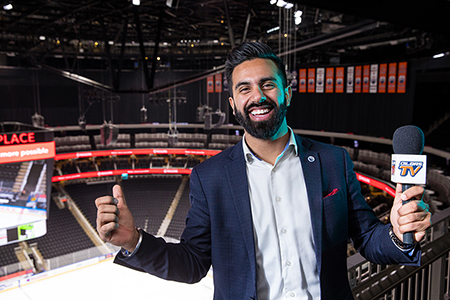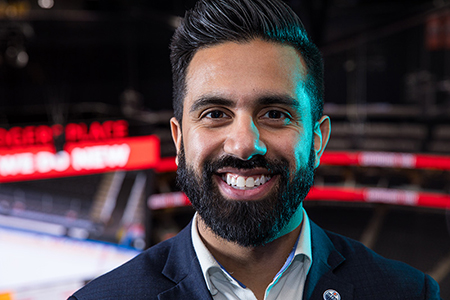Interviewing the NHL’s biggest stars all in a day’s work
Tony Brar knows the exact moment he chose to follow his dreams to be a sports broadcaster: Nov. 2, 2016.
Brar (Bachelor of Business Administration - Accounting ’16, Radio and Television ’18), had just completed his business degree at NAIT, but wanted to take a shot and follow his passion for sports – and hockey in particular.
Now, it’s like he scored a game-winning goal. Brar is a digital content producer with the Edmonton Oilers of the National Hockey League. He hosts broadcasts on the hockey club’s social media feeds and can often been seen during games on the giant video screen at Rogers Place.
Brar landed his job just three days after wrapping up his television practicum – even before convocation. Like any rookie who’s made the jump to the big leagues, he's in an enviable spot. But he’s worked hard to get there, including a stint as a commentator for Ooks men’s hockey.
Brar spoke with techlifetoday about his emotional connection to Canada’s pastime, his approach to work when the hometown hockey heroes are struggling, and what it’s like to interview the best player in the world.
Techlifetoday: What does your job as a digital content producer for the Oilers entail?
Tony Brar: I'm a reporter and host, covering practices, games, any roster moves we make, I host the weekly panel, and I report on the team for Oilers TV and EdmontonOilers.com. I write blogs, stories, and do game-day reports and game recaps. I talk to the players and coaches.
 When you were a student at NAIT, did you ever in a million years think you'd work for the Oilers?
When you were a student at NAIT, did you ever in a million years think you'd work for the Oilers?
Before Radio and Television, I was in business school at NAIT. I loved business.
It taught me so many different things that were transferable in developing my life skills, but after working eight months in the field, I felt like I wasn't chasing a dream.
As soon as I made the decision to go to school for Radio and Television, I felt like there would be an opportunity where I’d be able to live my [sports broadcasting] dream.
If you’d asked me in business [school] if I would ever work for the Oilers, I would have probably said no. But after a couple of months of getting my reps in TV and radio school, I felt like that was almost meant to be, but only if I kept working at it.
“I’ll never forget the phone call when I told him I got the job offer from the Oilers. I’d never heard him cry before.”
Were you an Oilers fan growing up?
They were my hometown team. When I ask myself why hockey means so much to me, it's all because of my dad. My parents [Nirmal and Darshan] came to Canada [from India] in 1981. When they got to Edmonton, dad fell in love with the Oilers.
That’s when Gretzky, Kurri and Messier were playing. They were winning Stanley Cups. He was so fixated on the Oilers, it became a staple in my life.
I didn’t get to see my dad very often, because he would always be working in camps by Fort McMurray. I only got to see him once every two or three weeks, but when he came home, hockey connected us. I’d sit in his lap and we’d watch the Edmonton Oilers on Saturday night.
What does your dad think of you working for the Oilers now?
He’s incredibly proud. I’ll never forget the phone call when I told him I got the job offer from the Oilers. I’d never heard him cry before. It was a special moment.
Embed from Getty Images
What is it like going to a job where you get to interview the world’s best hockey player, Connor McDavid?
Quite surreal, really. It’s special. This is a man who has changed an entire franchise. Getting to watch the highest level of hockey from this individual, and getting to talk to him every day is something that I don't want to take for granted. I remind myself of that as much as I can, because I know a lot of people would do anything to have my experience.
Who is your favourite hockey player to watch?
I have two. They both embody greatness: Sidney Crosby and Connor McDavid. Sidney Crosby is a role model for me because he shows what it means to be exceptional in fundamentals. I think No. 87 from Pittsburgh exemplifies that, if you build a solid foundation and a solid fundamental skill set, great things can happen.
Getting to watch Connor McDavid in practice, his work ethic, his work habits and how he conducts himself as a person outside of the rink is pretty special. We get to watch both of these players 60 minutes per night, but outside of that is the amount of work they put in to make that one-hour game exceptional.
When the team is struggling, how does your approach to your job change?
It stays the same. My approach every single day is to identify what the key story lines are, what do people need to know, and what do I want to tell people? It's tougher to make things seem enjoyable when the team is on a losing streak; when you’re winning, everything is a bit more lighthearted.
What's the best part of your job?
The people I work with. I love what I do, but the people I work with are unbelievable. They’ve allowed me to grow. Any question I've asked, any problem I’ve had, I’ve gone to my coworkers and we talked about it. They've really allowed me to flourish.
“You're never in a position to succeed if you don’t go all in.”
And the toughest part?
This is a job I've always wanted, and because of that, at times I feel like I'm very hard on myself. That can be constructive in some ways, but it can also be deteriorating. And having that work-life balance, especially with how much you work with the team.

When you were at NAIT, you were heavily involved with Ook webcasts and play-by-play commentary. What was the highlight of that experience for you?
It was getting to connect with some real big hockey minds.
As a big fan of the game, and still a student of the game, getting to talk to [men's Ooks hockey] head coach Tim Fragle and assistant coach Shawn Belle was phenomenal. Building friendships with those people wasn’t something that was even in my mind when I started. But I felt like I was a valuable member of the team.
What was your biggest takeaway from your experience in covering the Ooks?
You're never in a position to succeed if you don’t go all in. I was writing, I was doing interviews, I was trying to do on-air stuff, I was hosting events. I was able to flourish as much as I wanted, and do more than I ever expected in a short period of time because I just went for it.
Who inspires you to be a better broadcaster?
Two guys immediately come to mind. Kyle Bukauskas [a hockey host] from Sportsnet is just so good at what he does. I know how hard Kyle works. He defies the expectation that only experience can get you [covering the NHL in broadcast].
The other is James Duthie from TSN. He is one of the best hosts that you could ever ask for. It's pretty phenomenal how good he is in front of the camera.
Your career is just starting. What does the future look like for you?
Right now, I'm focusing on putting all my efforts into Oilers TV. I see myself being with the Oilers for the foreseeable future, but one of my dreams has always been to move to Toronto and work for one of the bigger sport networks down there, either TSN or Sportsnet.
Originally published in June 2019